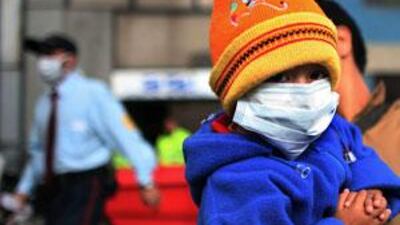NEW YORK // UN health officials yesterday declared the worldwide swine flu outbreak a pandemic, marking it as the world's first pandemic in more than four decades, with 74 countries affected and infections climbing across all four populated continents. The World Health Organisation (WHO) raised the alert level from phase five to six - the highest stage on the warning scale - meaning that a global outbreak of the so-called H1N1 virus had begun.
Announcing the threat, Dr Margaret Chan, the WHO director general, said the spread of the virus was accelerated by global air travel, and was being closely monitored by experts the world over. "The world is now at the start of the 2009 influenza pandemic," Dr Chan said. "We are in the earliest phase of the pandemic, the virus is spreading under a close and careful watch, no previous pandemic had been detected so early or watched so closely in real time, right at the very beginning."
Since the new flu strain emerged in Mexico and the US in April, it has spread to 74 countries as far apart as Iceland, Saudi Arabia and the Bahamas, infecting almost 30,000 people and causing 141 deaths. An increase in infections in the United States, Europe, South America and, notably Australia - where infections reached 1,260 on Wednesday - is understood to have prompted the pandemic threat. Dr Chan said that, unlike regular flu outbreaks, the virus disproportionately targets the able bodied. Although only of "moderate severity" and responsible for a relatively "small number of deaths", the pandemic could yet surprise scientists, she warned.
"The virus writes the rules and this one, like all influenza viruses, can change the rules, without rhyme or reason, at any time," she told reporters at WHO headquarters in Geneva. Although the agency stressed that most cases of swine flu are mild and require no treatment, the long-awaited pandemic announcement confirms that a new flu virus has emerged and is circling the globe. The last pandemic alert was raised in 1968 during the Hong Kong flu outbreak, which killed about one million people - significantly more than the 250,000 to 500,000 people who die each year from common flu.
Experts fear that a rash of new infections could overwhelm hospitals and health authorities, particularly in the developing world. Raising the threat level was expected to prompt governments to devote more money to containing the virus and trigger drug manufacturers to boost vaccine production. Last month, several countries urged the WHO against raising the pandemic alert for fear of adding to a panic that was already gripping people as far apart as South America and Asia.
In Buenos Aries this week, emergency health services virtually collapsed as Argentinians worried about swine flu flooded the hospitals. Last month, a bus arriving in Argentina from Chile, which has the most swine flu cases in South America, was stoned by people who believed one of the passengers had swine flu. In Hong Kong, the government shut down all kindergartens and primary schools for two weeks yesterday after a dozen students tested positive for swine flu; while in Australia, infections had jumped to 1,260 by Wednesday.
Saudi Arabia confirmed its first case of the H1N1 flu virus in a Filipina nurse on June 3, only days after Kuwait said 18 US soldiers stationed in the neighbouring Gulf emirate had been infected with swine flu. This month, the Government announced three laboratories in Abu Dhabi, Dubai and Sharjah will be developed to test for swine flu and other infectious diseases amid fears of infected passengers passing through UAE airports.
Hanif Hassan, Minister of Health, said yesterday the Supervisory Committee for Prevention from Swine Flu (H1N1) would hold an emergency meeting today at 11:00am to discuss measures to be taken in light of the WHO announcement, the state news agency WAM reported. Dr Hanif said the UAE is free of any swine flu cases and the necessary preventive measures had been taken in the country's airports, as well as land and sea ports.
Still, Dr Chan said that even countries yet to be affected or with only a handful of recorded cases, such as the UAE, "should remain vigilant" and will receive assistance from the WHO to curb the threat. The WHO is watching for any sign the disease is worsening as the germ circulates during the Southern Hemisphere's flu season, creating opportunities for its genes to mutate or combine with those of other viruses, including the H5N1 bird flu strain that's lethal in three of every five reported cases. The new virus has genes from other strains that have sickened humans, pigs and birds.
Three pandemics have occurred in the last century: the Spanish flu in 1918, the Asian flu in 1957, and the Hong Kong flu in 1968. The 1918 pandemic killed an estimated 40m to 50m people worldwide and is considered one of the deadliest diseases in human history, according to the WHO. Studies indicate that the new H1N1 virus is as severe as the 1957 Asian flu, which caused about 2m deaths.
jreinl@thenational.ae


